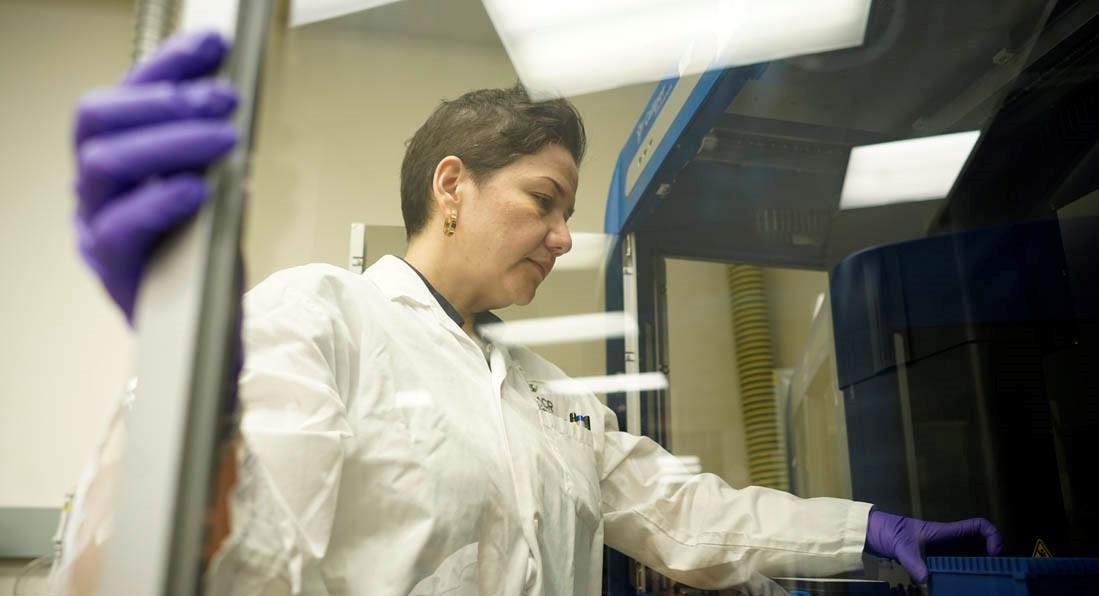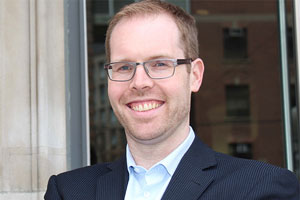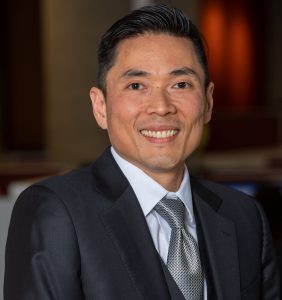Dr. Trevor Pugh talks about his new paper in Cancer Discovery and how it could help transform screening for people with Li Fraumeni Syndrome (LFS).
People with Li Fraumeni Syndrome (LFS) can never really forget about cancer.
Being diagnosed with LFS, a rare genetic condition, comes with a near 100 per cent risk of developing cancer in your lifetime. And because the disease is hereditary, it also means your parents, siblings and children could face the same unfortunate odds.
Targeted cancer screening programs for people with LFS (as set out by the Toronto Protocol) have gone a long way toward catching cancer early and giving them some peace of mind. But the constant testing can be a burden in itself, especially for people live far away from major hospitals. And even an annual combination of tests that includes bloodwork, ultrasounds and a full-body MRI can’t always find cancer as soon as it develops.
That’s why a landmark study by researchers at OICR, UHN and SickKids and funded by the Terry Fox Research Institute has the potential to transform how people with LFS are screened for cancer and give them a better chance at surviving the disease.
In the study, published in Cancer Discovery, researchers were able to find early signs of cancer in blood samples from people with LFS months before cancer was detected by other tests.
The signs they found were tiny fragments of tumour DNA that circulate in the bloodstream called ‘cell-free DNA’. Cell-free DNA from cancer cells is often detectable before the actual tumour is visible. And because they are in the bloodstream, you only need a simple blood sample to find and analyze them, which is easier on the patient than a taking a biopsy or a having a full-body MRI.
“We were able to detect multiple different types of DNA changes in blood that were a telltale sign that cancer was developing somewhere in the body,” Dr. Trevor Pugh, Senior Scientist at and Director of OICR Genomics, said in a news release.
Pugh co-led the study with Dr. David Malkin (SickKids) and Dr. Raymond Kim (UHN and the Ontario Hereditary Cancer Research Network). He also oversaw the genetic testing and analysis, which was conducted by the OICR Genomics Program.
OICR News recently sat down with Pugh to discuss this work, what it could mean for people with LFS, and what happens next.
How did you first get involved in this project?
That began many years ago when I first met Raymond Kim from Princess Margaret and David Malkin from SickKids, who are frontline geneticists working directly with patients who have LFS and innovators in the world of clinical genetics.
What resonated with me in speaking to them was the experience of families with LFS. They undergo a huge amount of surveillance to try and find cancer, which is extremely important but can be challenging for them. Many families having to travel long distances and sometimes stay in Toronto for multiple days in a row and get tested.
At the same time, the technology to test blood for signs of cancer – sometimes called ‘liquid biopsies’ – was advancing. So, we wondered what impact liquid biopsies could have on people and families that undergo such intense cancer surveillance.
What did you find as part of this study?
We looked back at blood samples from people with LFS that were taken as part of their regular surveillance.
We first looked at people whose other tests showed they had developed cancer. Sure enough, most of their blood samples tested positive for cell-free DNA. Then we looked at people whose surveillance gave them a clean bill of health. Just over a third of those patients also had signs of cancer in their blood.
So, we had inkling is that what we’re detecting in their blood are the earliest signs of cancer that don’t get picked by other kinds of testing. This was now an opportunity to start combining our molecular data with imaging to see what kind of lead time we were getting.
What’s the next step in this work?
The next step is a clinical prospective study where we’ll try to answer the question “so what?”
In contrast to our past work, we will now be testing cell-free DNA more frequently, every four months, and delivering results back to the managing physicians and their patients. If we see a cancer signal, we will confirm the finding with a clinic visit similar to their regular annual surveillance. This will show us whether we can actually find cancer earlier than the current annual surveillance approach and inform what we can do with that information to help people get treated as quickly and effectively as possible.
This is the really exciting part of the work where we move from retrospective mode, where history is already written, into prospective mode where we can put our results into practice. This new project brought together a big multidisciplinary team, including multiple patient advocates, to roll this trial out across the country.
How could you see liquid biopsies changing the way people with LFS are screened?
As my colleagues and I wrote in another recent journal article, liquid biopsies have the potential to shift the paradigm in surveillance for people with LFS and other hereditary cancer syndromes.
If we get positive findings from our upcoming trial, I could see blood tests ultimately being added to surveillance protocols in between other more intense testing. Then, if the blood test is positive for cell-free DNA, it could be the ‘canary in the coal mine’ that triggers a full screening.
This could go a long way in easing the anxiety that comes with having LFS and knowing you’ll likely develop cancer at some point. It also could improve access to cancer screening for people who live outside of larger cities, because a blood test can be taken just about anywhere.
What was OICR Genomics’ role in the study?
OICR Genomics is the backbone that supported this major collaboration. We worked closely with partners to develop blood biopsy technology that fit the unique needs of the study, and we generated the data that drove this discovery.
As a lab, our team is tailor-made to support these kinds of studies. We do everything from tissue extraction to laboratory work, bioinformatics and reporting, which allows the research teams we partner with to focus on analyzing the data and on engaging with patients.
OICR Genomics will also work with partners to use this technology to support other cutting-edge clinical trials. That means our collaborative efforts will ultimately have an impact on patients at all stages of their journey with cancer.





